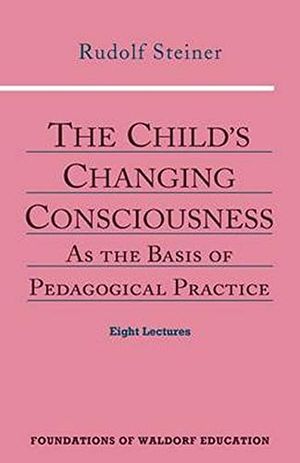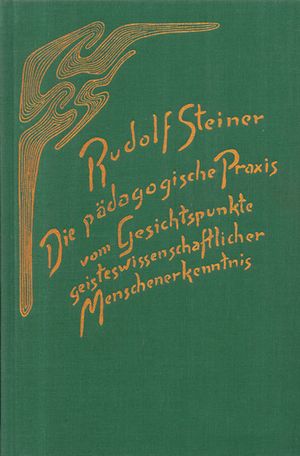GA 306


The Pedagogical Practice from the Viewpoint of the Spiritual-Scientific Knowledge of Man. The Education of the Child and Younger People
Die pädagogische Praxis vom Gesichtspunkte geisteswissenschaftlicher Menschenerkenntnis. Die Erziehung des Kindes und jüngeren Menschen
Eight lectures, three answers to questions and an address, Dornach 15 to 22 April 1923.
Three and a half years after the founding of the first Waldorf school in Stuttgart, Germany, these talks were given to an audience of Swiss school teachers, most having little knowledge of Anthroposophy. This is the context of these lectures, which are among Rudolf Steiner's most accessible talks on education.
A teacher who attended the lectures wrote in the Berne School Paper: "Every morning, as we listened anew to Dr. Steiner, we felt we had come closer to him and understood better what he had to say and how he had to say it. Daily, we newcomers gathered, asking ourselves: Why are more of our colleagues not here? It is untrue that anthroposophy limits a person, develops blinkers, or avoids real life ... Step by step, Dr. Steiner shows its application to life ... illumining the details and disclosing their connection with profound questions of life and existence. I came to the conference to stimulate my school work. I found benefit in abundance. But also, I unexpectedly received a greater richness for heart and soul--and, from this in turn shall stream richness for my classes."
In other words, these lectures are ideal for anyone who is approaching Waldorf education for the first time. Using language that any teacher or parent can understand, Steiner goes into the essentials of his educational philosophy, providing many examples and anecdotes to convey his meaning. In this way, against the background of the developing child, he allows the curriculum and the method of teaching to emerge as the commonsense conclusion of practical experience.
Contents
What is the difference between the Waldorf school and the mainstream school? What is meant by the main lesson or the lessons in a particular period at a Waldorf school? How and by what educational measures is the physical maturation process of the child taken into account? What about religious education? - These and many other questions are dealt with in detail in this educational course.
Literatur
- Rudolf Steiner, Roland Everett (Translator): The Child's Changing Consciousness: As the Basis of Pedagogical Practice: As the Basis of Pedagogical Practice. CW 306. Anthroposophic Press 2004. ISBN 978-0880104104; eBook ASIN B005IGJAAM rsarchive.org
German
- Rudolf Steiner: Die pädagogische Praxis vom Gesichtspunkte geisteswissenschaftlicher Menschenerkenntnis. Die Erziehung des Kindes und jüngeren Menschen., GA 306 (1989), ISBN 3-7274-3060-5 English: rsarchive.org German: pdf pdf(2) html mobi epub archive.org
 |
References to the work of Rudolf Steiner follow Rudolf Steiner's Collected Works (CW or GA), Rudolf Steiner Verlag, Dornach/Switzerland, unless otherwise stated.
Email: verlag@steinerverlag.com URL: www.steinerverlag.com. Index to the Complete Works of Rudolf Steiner - Aelzina Books A complete list by Volume Number and a full list of known English translations you may also find at Rudolf Steiner's Collected Works Rudolf Steiner Archive - The largest online collection of Rudolf Steiner's books, lectures and articles in English. Rudolf Steiner Audio - Recorded and Read by Dale Brunsvold steinerbooks.org - Anthroposophic Press Inc. (USA) Rudolf Steiner Handbook - Christian Karl's proven standard work for orientation in Rudolf Steiner's Collected Works for free download as PDF. |
